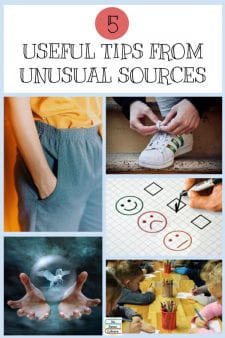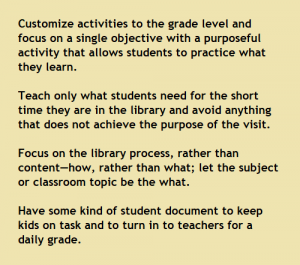 Throughout the school year, School Librarians tackle the recurring and everlasting problem of students with overdue library books. Each school seems to have its own special problems and each librarian contrives some unique solutions. There is, however, one constant for all of us: the clichéd excuses students offer about their overdue library book.
Throughout the school year, School Librarians tackle the recurring and everlasting problem of students with overdue library books. Each school seems to have its own special problems and each librarian contrives some unique solutions. There is, however, one constant for all of us: the clichéd excuses students offer about their overdue library book.
These excuses can be especially troublesome when the student is at the circulation desk and we’re trying to check out books for 30—or 60—students before the end of a period. However, if we understand the underlying cause of these overdue excuses, we can respond calmly and more productively. Whether you are elementary, middle school, or high school, when we tell a student they have an overdue library book, the ‘reasons’ offered come in 3 forms: avoidance, blame, or contrition.
AVOIDING THE PROBLEM OF AN OVERDUE BOOK
An avoidance response is non-confrontational, and we don’t want to escalate it. We just need to provide a simple prompt to give the student a possible solution. Here’s how I handle 4 common avoidance excuses:
 |
The “I don’t remember that book” excuse is a spur-of-the-moment avoidance response. I tell the student the date the book was checked out, grab one of my handy Overdue Notice Bookmarks, write the book title, and slip the bookmark into the new book as I check it out. When I hand the book to the student I ask them to ‘look in their locker and at home, and get it back to me as soon as they find it.’ |
 |
The “I don’t know where it is” excuse is probably the truth, and why the book is overdue. I follow the same bookmark procedure and tell them I’m sure they’ll find it if they look around their locker and at home. |
 |
With the “I never checked that book out” excuse, the student is embarrassed and doesn’t want us to make a big deal about it. I gently remind them I scanned their ID badge or they entered their ID number on the keypad, so they must have checked it out. I grab the overdue bookmark, add the title and, in this case, the date checked out, hand it over in their new book and give the standard ‘look in locker and at home’ request. |
 |
The classic “I already returned that book” excuse is often a bluff in hopes we’ll let it go. Since even super-librarians make check-in mistakes, I grab a sticky note, write the call number and title, and give it to the student, telling them to go find it on the shelf and bring it to me. If it is a check-in mistake, I apologize and scan the book, making a joke about ‘these darn computers’ or, in my case, ‘this gray hair.’ If they can’t find the book, I follow the usual procedure with the Overdue Notice Bookmark. |
Students get a kick out of my ‘gray hair’ reference: I tell them my hair is gray because all the color has leaked out, and now I make a lot of mistakes because my brains are leaking out, too.
BLAMING SOMEONE ELSE FOR AN OVERDUE BOOK
Blame excuses are confrontational, and we definitely can’t let them go; however, we need to realize that blame is really avoidance accompanied by a fear of retribution. If we respond in a calm manner, offering a workable solution that puts the onus where it belongs, we’ll avoid escalating the situation by removing the fear. Here are 4 examples.
| “Someone stole it!” is the universal middle school answer for anything that’s missing. If your school is like mine, a few library books do get shuffled around in the gym or cafeteria, so I simply sigh and sympathize that it happened, as I’m filling in the title on that handy overdue bookmark. Sympathy defuses the fear and when I hand the student the bookmark I tell them to take another look for it…just in case it’s in a locker or at home. |  |
|
The “I gave it to my friend to read and she’ll return it” excuse sounds like such a noble gesture, but it really shifts the burden of responsibility to another student. I ask if the other person is in the library, and if so, have them bring the book up to check it in and then I can check out the book to the newly responsible party. If the other student is not in the library, I gently remind the student that as long as the book is checked out to them, they are responsible for it, so they need to bring either the book or the student into the library so we can solve the overdue…and I give them the overdue bookmark as a reminder. |
 |
| The “Are you sure I checked that book out?” excuse implies the problem is our fault, but we can maintain our cool. I remind the student that we use our IDs for checkout so a mistake is unlikely, but since it is possible, they can help me by looking around a bit for the book, in their locker or at home, and I hand them the overdue bookmark with the title and the checkout date. |  |
|
I lament the “My teacher was supposed to return it” blame excuse, because I do have ELA teachers who tell students to put library books to return near their classroom door. Often other students grab a book they want to read before the teacher can return it. I have no control over this, so I tell the student to ask the teacher for permission to get the books from the classroom. If no, then I do an overdue bookmark and remind the student to check for the book in class the next day. Eventually someone does return it. |
 |
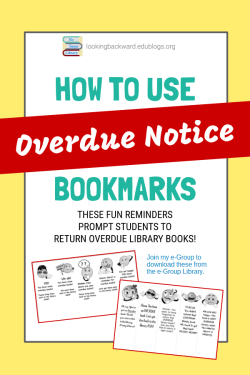 You’ll note that, during a book checkout, students whose accounts show an overdue get an Overdue Notice Bookmark with the book title written on it. Why do I use this method? Because the student sees this bookmark every time they’re reading their current book and it prompts them to look for the overdue one and return it. I do run overdue notices at periodic intervals, but these bookmarks allow a friendly face-to-face conversation and tend to bring books back much more quickly.
You’ll note that, during a book checkout, students whose accounts show an overdue get an Overdue Notice Bookmark with the book title written on it. Why do I use this method? Because the student sees this bookmark every time they’re reading their current book and it prompts them to look for the overdue one and return it. I do run overdue notices at periodic intervals, but these bookmarks allow a friendly face-to-face conversation and tend to bring books back much more quickly.
CONTRITE ABOUT THE OVERDUE…BUT…
Contrition is when a student admits to the overdue book but can’t return it for some reason. These excuses are easy to handle because the student accepts responsibility and just needs an opportunity to retrieve the book or a reminder to bring it back to the library. The worst thing we can do with these excuses is make a big deal about them, so I laugh and take them in stride.
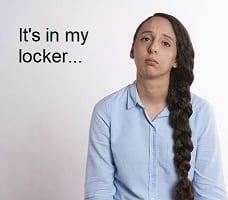 |
“It’s in my locker…” is the typical excuse when a student has forgotten it’s a library day. I created a special ‘Library to Locker for Overdue Book’ Pass and I hand one to the student so they can get their book and return it. I have 6 numbered passes, to limit how many students are out and about during the period. |
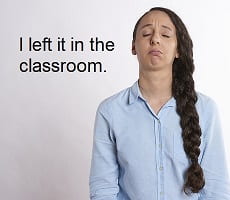 |
I know “I left it in the classroom” seems silly since the student just came from the classroom, but it proves my belief that middle schoolers are ‘brain dead’. I tell the student to ask the teacher’s permission to return to the classroom. The teacher knows these students better than I do, and who is trustworthy enough to allow this. If they don’t, the student gets the overdue bookmark and I usually get the book dropped off right after the class period or the next day at the start of the class period. |
 |
“I forgot to bring it back to school!” is an easy excuse to handle with some sympathy and the Overdue Notice bookmark. If it’s a long-time overdue, I’ll have the student leave a phone message to remind themselves to bring the book back to school. The kids find this funny; I find it works. |
 |
Often a student says “I think I lost my book” as I pull up their account on the computer and they know they have somehow misplaced a book.
|
 |
If the ‘lost’ book does show as overdue, I ask when they last saw the book as I fill out the overdue bookmark. We need to accept that students misplace things—after all, they’re still learning to become adults. I joke that the book must have been partying with the other books, and hand them their new book. The student laughs and says “Yes, Ms. P, it’s a book with legs!” We all have a good laugh and the book routinely turns up later on and is returned. |
DO WE REALLY NEED A “SOLUTION” FOR OVERDUES?
Each morning during the last week of a grading period, I take a bookcart to a hallway where kids are getting into their lockers before first period. Reciting my mantra, “Library books, collecting library books!” as I walk down the hall, kids grab books and put them on the cart. I do 2 hallways each morning, so by the end of the week I’ve done all 9 hallways, and collected huge numbers of books. This tactic does solve many overdues.
Keep in mind that kids are busy. We adults have a single focus—our subject—and we often fail to appreciate that students must re-calibrate their brains 6 or 8 times a day for different subjects with different teachers in different classrooms. If they forget to return a school library book, we can be forgiving, especially since harsh repercussions don’t work and only alienate student readers. I’ve found 3 benevolent tactics that I believe we can all adopt:
- Get rid of overdue book fines. Whatever the original reasoning behind fines, they don’t work. Fines keep books out of circulation, and they discourage students from returning books and checking out new ones to read, the opposite of what we are trying to accomplish.
- Always allow a student to check out a book. We can limit a student to a single book if they have overdues, but depriving a student of a book does nothing in the moment to get that overdue back. Rather, it creates resentment toward us and ill feeling about the school library, and may cause the student to have more confrontation with their teacher who wants them to have a book. All of this is just plain bad public relations.
- Quit thinking they’re “our” books, or even “the school’s” books. In a school library, the books belong to the students. They are provided for them with public funding, and we are only the ‘warehouse manager’. A Facebook comment from School Librarian Jen M. Hash-Staley convinced me:
I always have missing books at the end of the year, I don’t let it bother me much anymore. Tax paying parents funded the purchase, so I like to think that they are enjoying a tax rebate. Crazy talk I know.
Going ballistic over overdues does nothing good. We need to figure out congenial ways to cajole students into returning overdue books. Having a friendly, non-judgmental policy toward overdues will increase both circulation and reading, and go a long way toward building positive attitudes toward the school library.
And remember, a student is always more valuable than a book!
| You can find the complete set of 35 Overdue Notice Bookmarks in No Sweat Library, my Teachers Pay Teachers store! |  |
![]()

 When I tell them the book doesn’t show up on their account at all, they’re thrilled that it’s been turned back in to the library!
When I tell them the book doesn’t show up on their account at all, they’re thrilled that it’s been turned back in to the library!


